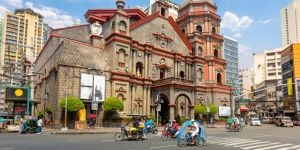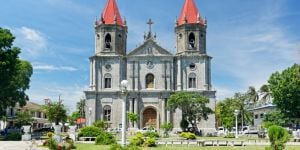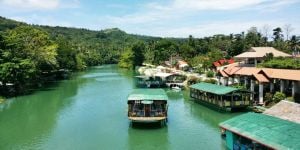Passengers denied entry into Philippines stuck at NAIA
As we all know, if someone tries to come in and they are on some list, they will not let you in. I still find it worthy to post this information.
Story by MARIZ UMALI, GMA Integrated News • 1d •
Some arrivals at NAIA Terminal 1 are now stuck in the transit lounge area after the Bureau of Immigration denied them entry into the country for various reasons.
According to Bureau of Immigration (BI) deputy spokesperson Melvin Mabulac, possible reasons include having been charged with or convicted of crimes involving moral turpitude, such as sex offenses; having been blacklisted; or having Interpol alerts issued against them.
To provide them with some privacy, wooden dividers with a sign saying "Inadmissible Passenger Holding Area" have been set up for them. Some have settled into the gang chairs, while others have laid down cardboard on the floor to sleep on.
Manila International Airport Authority (MIAA) General Manager Eric Jose Ines said they are aware of the situation and are taking action. They have tried to coordinate with the BI to transfer the excluded passengers to NAIA Terminal 3, but this was not allowed by the bureau.
Mabulac said once a passenger is excluded, they are turned over to the airline operator and should be boarded on the first available flight without waiting.
“We have to understand there are security concerns. Once yan ay ma-exclude itini-turn over po yan natin sa airline operator and it should be boarded the first available flight. There should not be waiting time. Yan po ang konsepto kasi they are threat to our national security,” he said.
The BI is strictly implementing the exclusion policy in accordance with the Philippine Immigration Act for national security. As of last year, more than 3,300 passengers were reportedly denied entry into the Philippines.
Steps to provide more suitable accommodation for the excluded passengers are being considered. MIAA head executive assistant Chris Bendijo said the agency is exploring repurposing the original day room and emphasized that airlines should be more responsive in immediately flying out these excluded passengers.
“We will continue to look for more suitable locations, more humanitarian. It’s not acceptable that even if they are excluded passengers that they will be sleeping on cartons or sa mga sahig. We are exploring either yun nga repurposing yung original na day room. Our airlines should be more responsive to these matters because it is their obligation for these excluded passengers to be flown out immediately,” Bendijo said. — BM, GMA Integrated News
@danfinn This is actually a good thing in my opinion. No one wants sex offenders or criminals in their country. Today in the USA, several immigrants are crossing the borders illegally. A good percentage of these individuals have criminal pasts
@danfinn
My question is, how come nobody knows about "some list" except the PH BI? Why don't airlines have the "some list" and the perp's homeland agencies? That way the flight to PH is never booked or boarded in the first place.
@danfinn This is actually a good thing in my opinion. No one wants sex offenders or criminals in their country. Today in the USA, several immigrants are crossing the borders illegally. A good percentage of these individuals have criminal pasts
-@daytradersteve13
Amazing how the Philippines has demonstrated (by this news article) much better control of its borders than the US.
@danfinn
My question is, how come nobody knows about "some list" except the PH BI? Why don't airlines have the "some list" and the perp's homeland agencies? That way the flight to PH is never booked or boarded in the first place.
-@jozica
The lists include blacklists (perp should already know about but not necessarily the airlines), moral turpitude (sex crimes), and other law enforcement lists that are available internationally to BI but apparently not checked by the airlines. Perhaps the expense of accessing FBI, Scotland Yard and other national law enforcement agencies plus published court records is within the BI budget, or much of it is free for them, but for airlines to access those records at the ticket counter might be too expensive or just too complicated for their equipment to handle. Accessing it could save them the cost of paying for a few thousand deportations per year but perhaps it is cheaper to just deport these people rather than upgrade their process to include international law enforcement databases. Again, perps should be aware of any likelihood of being on the lists so no sympathy there...I assume airlines will do what they can to recover their costs.
***
Reason : Political comment
We invite you to read the forum code of conduct
@danfinnMy question is, how come nobody knows about "some list" except the PH BI? Why don't airlines have the "some list" and the perp's homeland agencies? That way the flight to PH is never booked or boarded in the first place. -@jozicaThe lists include blacklists (perp should already know about but not necessarily the airlines), moral turpitude (sex crimes), and other law enforcement lists that are available internationally to BI but apparently not checked by the airlines. Perhaps the expense of accessing FBI, Scotland Yard and other national law enforcement agencies plus published court records is within the BI budget, or much of it is free for them, but for airlines to access those records at the ticket counter might be too expensive or just too complicated for their equipment to handle. Accessing it could save them the cost of paying for a few thousand deportations per year but perhaps it is cheaper to just deport these people rather than upgrade their process to include international law enforcement databases. Again, perps should be aware of any likelihood of being on the lists so no sympathy there...I assume airlines will do what they can to recover their costs.
You'd think today's computers can stay ahead of the curve. Somehow PH BI gets the info no problem.
Philippines has demonstrated (by this news article) much better control of its borders than the US.
-@danfinn
Amazing how much bigger the Pacific Ocean is than the Rio Grande River.
Forgive me. Admittedly, I know precious little about PH immigration rules, but I'm curious as to whether all of the individuals who'd been denied entry were citizens of visa-exempt countries. Or perhaps they were visa-on-arrival applicants where the applications were subsequently denied?
If not, and if those people held valid visas to enter, I would think that that would absolve the airlines of liability to return them, having verified the people's visas to enter the PH prior to boarding. To the best of my knowledge, airlines are not yet required/expected to conduct criminal background checks.
If it is the case that they did hold valid visas, how is it that their visa applications were approved? How were the visas sourced? Agencies?
We hear very little of such situations here in Vietnam.
@Aiden
Does it matter? If visitors are undesirable immi has every right to turn them back and obviously have good access to international data unlike many countries, for me a step in the right direction and perhaps those turned away should have done their homework better. Don't blame the carriers or the visa issued from a country with outdated systems.
OMO.
Cheers, Steve.
@Aiden Does it matter?
In my opinion, it certainly should. For the airlines it matters from an economic point of view. For immigration it matters in terms of security.
If visitors are undesirable immi has every right to turn them back...
Absolutely agree. Immigration, in all countries, have the right to refuse entry for any reason, whether the traveller is a valid visa holder or not.
... and obviously have good access to international data unlike many countries,...
With PH immigration having "good access" to such data, and (perhaps incorrectly) assuming the people denied entry held valid visas, then why were the visa applications approved? If the traveller's passport raised a red flag at the immigration desk upon arrival, how is it that that same red flag wasn't raised when the visa application was being reviewed/processed?
... for me a step in the right direction and perhaps those turned away should have done their homework better.
I'm in total agreement that a stringent customs-immigration clearance process is not only desirable, but also necessary in maintaining the safety and security of the state and its people.
Don't blame the carriers or the visa issued from a country...
I didn't. If you read my post again, you'll find that I've apportioned "blame" to neither.
...with outdated systems.
I don't understand. You had said, "...immi has every right to turn them back and obviously have good access to international data unlike many countries..." (?)
OMO.Cheers, Steve.
I'm sorry, I'm unclear as to what OMO means.
A few thoughts - it does seem like the Philippines immigration is doing a good job screening travelers given the number they've turned away. Though I can understand the airlines' frustration at having to deal with deporting people they brought in. Wondering if there's a way they could work more closely with immigration earlier in the process, like allowing for some basic database checks on tickets. At the end of the day though, a country has every right to control its borders and prioritize security. Those denied entry must have surely raised some red flags.
@Aidan in HCMC
OMO = Only my opinion.
Valid points raised but at the end of the day? Those applying for a visa in their home country or simply on arrival already know their past no matter the country intended to be visited and knowledge of the laws for those countries, Don't blame an airline company nor an immigration scrutiny.
If I was a convicted pedophile, murderer, bank robber, red flagged terrorist etc. I am aware and the buck stops with me.
I think it's fantastic that the Philippines has finally jumped on board with technology to keep shall we say undesirables out to protect the people and country. All should jump on board.
Is it any different to having an exit flight from the Philippines? The airlines monitor that but not convicted criminals as there are privacy laws.
As said it really falls back onto the travelling individual to secure his/her travel to foreign countries and the laws of that country.
Cheers, Steve.
@bigpearl
Thank you for that, and again, I'm in full agreement with you.
I've had similar discussions with (usually new) members on the VN forum, and I've always held that as expats/travellers/tourists it matters not a tot whether we agree with a country's laws, immigration criteria, customs, etc. As a sovereign nation a country sets its own rules, and we are obliged to follow them. Believe me when I tell you that there are some (many!) things in Vietnam I feel very strongly about, yet curiously those things seem totally unaffected by my emotions . Go figure.
That said, my curiosity remains unsated.
To wit, were the travellers...
a) V.O.A. applicants
b) from visa-exempt countries
or
c) holders of valid visas?
I ask these questions out of genuine curiosity only.
Allow me to add an "or, d)" to that
or
d) agency hanky-panky
I add this due to it having been a major issue here in VN until recently. I'm not sure whether this is even applicable to PH.
Again, just a curiosity exercise.
Who cares Aidan, the buck stops at the border in all (well most countries) and adhere to the laws we must.
Granting a visa from one country doesn't mean the destination will accept and blaming the issuer of the visa matters little/nor airlines.
As clearly said crimes of moral turpitude may be accepted/ignored by many countries not most. The issuing of a visa from one country may not be accepted at the destination.
As for the break up of your a,b,c and those turned away from those trying to enter many countries? One can only thank our Gods for the internet and a pat on the back for the Philippines for welcoming the 21st century.
If you are serious about the rejections from entering a foreign country I'm sure a little research will give the answers.
Cheers, Steve.
Who cares Aidan,
Aidan does. Okay, maybe not "cares" cares, but he's certainly curious.
...the buck stops at the border in all (well most countries) and adhere to the laws we must.
I believe we've established that we both agree with this.
Granting a visa from one country doesn't mean the destination will accept and blaming the issuer of the visa matters little/nor airlines.
But why would PH immigration grant an entrance visa if the traveller's clearance through customs will not be accepted? I can understand this if some infraction was committed after the issuance of the PH visa, but prior to the traveller's arrival. Otherwise, why wasn't the application rejected when it was being reviewed, as clearly the officer manning the customs desk was made aware of an issue with that person's passport? Might it be something as simple as the office responsible for visa issuance not sharing the same database as immigration(?).
That is the case here in VN, where the land border-crossings are manned by the military, while the int'l airports are manned by immigration officers, with neither sharing a common database. Yes, occasional headaches do occur for travellers.
As clearly said crimes of moral turpitude may be accepted/ignored by many countries not most. The issuing of a visa from one country may not be accepted at the destination.
If a visa was issued to travel to/enter PH, it was issued by PH. No country is able to issue a visa allowing a person to enter a different country. Only PH can issue a visa allowing the entry of a foreigner to PH.
As for the break up of your a,b,c...
and, d)
... and those turned away from those trying to enter many countries? One can only thank our Gods for the internet and a pat on the back for the Philippines for welcoming the 21st century.
They deserve a pat on the back if those passengers were allowed to board their flight due to a),b), or d). If, however, they were allowed to board due to c), then I suggest PH immigration and the office responsible for the issuance of visas merge their databases.
If you are serious about the rejections from entering a foreign country I'm sure a little research will give the answers.Cheers, Steve. -@bigpearl
Believe me when I say that I am more than a little familiar with the many reasons a traveller might be refused entry to a foreign country. At this point, though certainly no formal authority on the subject, further research on my part would be mostly redundant.
I'm still wondering though, how/why the people were allowed to board their flight.
a) V.O.A. applicants
b) from visa-exempt countries
c) holders of valid visas
or,
d) agency hanky-panky (is that even a thing there?)
My thoughts? If a) or b), I would expect closer scrutiny vis-a-vis enhanced pre-boarding screening for future arrivals. If c), an internal enquiry, the results of which may not be made public. If d),...?
It would be very interesting to eventually find out.
Philippines has demonstrated (by this news article) much better control of its borders than the US. -@danfinn
Amazing how much bigger the Pacific Ocean is than the Rio Grande River.
-@mugteck
Which again is irrelevant as the US immigration problem is essentially engineered by the reversal of rational policies created by the previous administration. The Rio Grande is not and never had been a barrier, obviously, only policies of enforcement. And the Pacific Ocean is not stopping thousands of Chinese who illegally enter by container ship. There is a huge number of illegal Filipino aliens in the US that apparently were not stopped by the Pacific Ocean either, due to non-enforcement of overstaying. At one time, citizens could be paid a bounty from INS for reporting illegal aliens but those programs ended long ago. Hopefully the newly elected president of 2024 will bring that back and return to the 2019 policies. It would be best, after all, since not supporting rule of law is not just a petty USA progressive shortcoming.
As said Aidan who cares. you are answering your own questions and if you are passionate enough will get definitive answers on a, b, c and d. with research. I would guess as an uneducated idiot that most come here for the 30 day free visa while very few would bother obtaining a visa in their home country as not needed, only for newbies that never travelled nor can't research/read.
If a person has a convicted crime history (any country) and the laws in a/any particular country prohibit immigration status? Good enough for me.
Cheers, Steve.
But why would PH immigration grant an entrance visa if the traveller's clearance through customs will not be accepted?
-@Aidan in HCMC
For the fees, to give the airlines additional passengers
Sure is a lot of "hang em" going on here.
According to Bureau of Immigration (BI) deputy spokesperson Melvin Mabulac, possible reasons include having been charged with or convicted of crimes involving moral turpitude, such as sex offenses; having been blacklisted; or having Interpol alerts issued against them.
The above, quoted from the article does not specify any charge directed towards the individuals currently sitting at NAIA. If fact, it's quite vague! "POSSIBLE REASONS INCLUDE...." . There is so much open to the imagination there.
I tend to think we pretty much all would want certain types denied entry into our country or other countries. But the vagueness ......who knows. I'm confident, that while some members here might think this is tougher than their home country. They are probably quite wrong. This is at an airport check-point of Immigration. Not some random sailboat coming in at night to anchor off the coast of Bohol. For probably the vast majority of us, our home country is much tougher to enter legally. And people flying in, are "generally" trying to enter legally.
@Larry Fisher
Many people coming are stopped at the border, Phils come with good intent and are harmless, some it seems are stopped at the border for various reasons and not in our control to judge. That's up to border security and little more same as all countries,,,,,,, except some.
Cheers, Steve.
@danfinn
This is privileged information. Only the perpetrator and law enforcement know. Therefore the immigration agency would know on arrival, but the airlines would not.
Airlines do not run background checks on passengers. They do have no fly lists. People with moral perpertude crimes can still fly.
I am only guessing that if the person applied for a visa they would be declined and therefore know before boarding a flight.
I wish we had a government here in the USA that was following the law.
In the past many pregnant Chinese women would enter the country legally and have their child here. They then would return to China and the baby would be a US citizen.
@Enzyte Bob
Can't wait to see the anchor baby law reminded. My wife worked in Hong Kong and they don't get citizenship.
@danfinn
This is privileged information. Only the perpetrator and law enforcement know. Therefore the immigration agency would know on arrival, but the airlines would not.
Airlines do not run background checks on passengers. They do have no fly lists. People with moral perpertude crimes can still fly.
I am only guessing that if the person applied for a visa they would be declined and therefore know before boarding a flight.
I wish we had a government here in the USA that was following the law.
Generally, all information concerning arrests and convictions are public domain.
-@vanvalenmikevan
Remember for most travelers to the Philippines they don't need a visa to enter, only a valid passport.
The way I see it from previous posts, the airline provides the transportation and is not responsible for screening the background of it's passengers.
So if a perp is denied entry, why would the airline be responsible for the deportation? If the perp is held in the transit lounge at the airport somebody has to pay for the return flight.
Maybe if the perps are held in an airport jail, that would be a good inducement for the perps to pay for their own deportation ticket.
PAL takes the attitude out of JFK that if a non citizen is flying to the Philippines then they must have a ticket out of the Philippines within 30 days if they only qualify for a tourist visa. I know a guy in fall of 2022 denied boarding a nonstop from JFK, thought he could fly because his wife a dual citizen and he was balikbayan, had travelled with her in the past. Trouble was she was waiting for him in the Philippines, had not yet purchased return tickets. So PAL will stop people for such a reason, it is my understanding that if they would have let him on that plane, when he would have been denied entry in Manila they would have been responsible to get him out of the Philippines.
.
So if a perp is denied entry, why would the airline be responsible for the deportation? If the perp is held in the transit lounge at the airport somebody has to pay for the return flight.
Maybe if the perps are held in an airport jail, that would be a good inducement for the perps to pay for their own deportation ticket.
-@Enzyte Bob
They could make them use the return ticket they showed to hopefully get the tourist visa.
Remember for most travelers to the Philippines they don't need a visa to enter, only a valid passport. -@Enzyte Bob
I did not know that. Thank you.
.So if a perp is denied entry, why would the airline be responsible for the deportation? If the perp is held in the transit lounge at the airport somebody has to pay for the return flight.Maybe if the perps are held in an airport jail, that would be a good inducement for the perps to pay for their own deportation ticket. -@Enzyte Bob
*************************
They could make them use the return ticket they showed to hopefully get the tourist visa.
-@mugteck
************************
I never thought of that (exit ticket)
But, it could be 30 days later or to possibly to another country other than the perps country.
ob
*************************
They could make them use the return ticket they showed to hopefully get the tourist visa. -@mugteck
************************
I never thought of that (exit ticket)
But, it could be 30 days later or to possibly to another country other than the perps country.
-@Enzyte Bo
The airline could move up the return ticket to the next flight out. What does the Philippines care where the exit ticket goes? No longer their problem.
It's not only felony crimes. My passport was seized in the Philippines due an error in child support payments that was caused by Friend of the Court.
@jozica That's how it's supposed to work. If a traveler isn't allowed in the country to which the flight lands, they're not permitted on the flight. Looks like someone dropped the ball. If you try to fly to the US without the proper paperwork or if anything is amiss, you are not allowed to board the flight.
thedfords said . . . . If a traveler isn't allowed in the country to which the flight lands, they're not permitted on the flight. Looks like someone dropped the ball. If you try to fly to the US without the proper paperwork or if anything is amiss, you are not allowed to board the flight.
**********************************
Excuse me sir, just a few more questions.
Who dropped the ball and is responsible for the ball?
Concerning going to the Philippines: The only paperwork the airline is responsible for is that you have a ticket for the flight and an exit ticket.
@Enzyte Bob. Obviously you've never traveled with a philippina. If there is any sign that a person will not be allowed in the destination country, that person will not be allowed on the flight. Whoever provides your information is lacking. The ticket agent doesn't just check the ticket on international flights. Your visa and passport must be acceptable along with the receipt for the airport tax. The airline is held responsible and must fly that person back to their country of origin if a mistake like this is made and I'm certain that ticket agent will be terminated. Hopefully you will know what you're talking about the next time you spout off without knowing what you're talking about.
An American needs a valid passport, and if flying as a tourist needs an exit ticket from the Philippines Within 30 days. Have flown with a Filipina dual citizen, required paperwork to allow her to enter as a duel citizen and for me to enter as balikbayan. My lurid lawless history was never questioned.
I’m an american, my wife (Filipino Citizen) and i departed LAX on the 11th of March flying EVA air to Cebu. My stay is as stated on my airline tickets is 12 March - 1 June. We landed in Cebu on time and easily made our way from Immigration to Baggage claim, and finally customs without incident. My passport was stamped by Immigration as ”Balikbayan”. The reason i am posting this just as i did for my trip last year is to provide a current experience at Los Angeles. Not sure what happens at any other point od departure in the US.
Lol. My wife was denied access to the flight because her greencard had expired while we were in the Philippines. I never thought they would deny access for that. As you can imagine I was not happy. I thought all they needed was passport with six months... This was 30 years ago.
Make your relocation easier with the Philippines expat guide

Lifestyle in the Philippines
About to move to the Philippines? Wondering how you're going to adapt to your new environment and lifestyle? ...

Developing your social circle in Manila
When moving to a new city, invariably, the friends you meet and cultivate first will make the most impact and can ...

Leisure activities in the Philippines
Consisting of more than 7,000 islands, the Philippines is a real treasure that you can explore during your stay ...

Diversity and inclusion in the Philippines
The culture of the Philippines is very diverse. This is due to the large mix of different nations in this country, ...

Accommodation in Iloilo
Iloilo, nicknamed the 'Heart of the Philippines', is a province stretching over 4,663 km² in the ...

Tax in the Philippines
When moving to the Philippines, especially if you are going to work or set up a business there, you will probably ...

Obtaining a Philippines driving licence
Whether you are converting your existing foreign driving license or applying as a first-timer for a Philippines ...

Accommodation in Cebu
Located in the Visayas region, 750 km from Manila and West of the Negros Island, Cebu is one of the major ...
Forum topics on living in the Philippines



